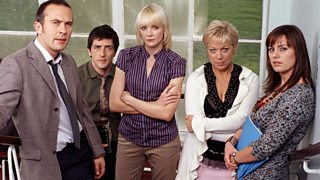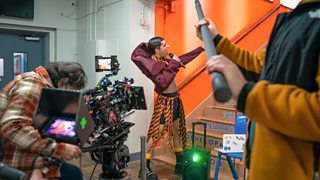Writer, Georgia Affonso, shares her experience of being selected for the Waterloo Road Shadow Scheme as part of the ±«Óãtv Writersroom's Drama Room 2021/22 group.
Trailer: Waterloo Road
One of my highlights of 2022 was being selected for the Waterloo Road Shadow Scheme as part of ±«Óãtv Drama Room 2021/22. As a teen, I used to avoid maths homework and instead get engrossed in the lives of Chlo, Janeece and the inimitable Steph Haydock. Sorry to my old maths teachers, but let’s be honest, now it’s all been worth it.

Cast members from the original series of Waterloo Road from 2006-15, including Denise Welch as Stephanie "Steph" Haydock
Before we applied, all of us were given a chance to read the show Bible (a document that gives details on characters, episodes, themes, series arc etc) and spent a day on Zoom learning from Executive Producer Cameron Roach and his team. We were then given a couple of weeks to develop a written pitch for an episode and a few pages of script. When I got through, I was ecstatic, relieved (you get paid!) and now faced with the challenge of explaining what a Shadow Scheme was to my family.
Shadow Schemes can vary, but they aim to give you the experience of writing on a TV show without the responsibility of an episode that will be broadcast. Waterloo Road is a ‘producer-led’ show which means that the producers make the key decisions over the series arc. We were given an outline of all the plots that needed to be in our episode and then our job was to weave them together and turn them into an entertaining script. They try to make it as close to the real thing as possible, you get a script-editor, access to the research team and quick turn-around deadlines.

Cast members from the 2022 series of Waterloo Road. Photo Credit: ±«Óãtv/Wall To Wall/Rope Ladder Fiction/David Gennard
First, we created a ‘scene-by-scene’ which is where you bullet point what order the scenes will come in. It felt like a sort of puzzle, you are trying to make about 4-5 story-lines work together, get the rhythm of the episode right and make it fit into an hour. I would define my relationship with scene-by-scenes as ‘It’s complicated’ but the high points are when you figure out how to tie multiple plots together and you feel like a TV genius.
Next, it’s time to write the actual script. The scene-by-scene is really handy here (this is a message to future me, do the planning, the planning works!) For this first draft of the script, I focussed on making sure all the story beats fit into the episode, I did a lot of staring at the map of the school and googling whether teenagers still say "peng".
My feedback for the first draft was also tied in with one of the most fun parts of the project – the set visit! I’d never been on a tv set before, and giddily showed up like a kid on a school trip. I was given a tour of the set and loved seeing the small details like the photos on Kim’s desk. Being on set reminds you how many people it takes to make a tv show – extras, make up, lighting crew and loads more. Getting to watch actors film a scene was amazing. I don’t know how they manage to be so convincing with a camera right in their face, then they stop acting and are a totally different person - magic!

Khalil “Kai’ Sharif (ADAM ALI), Miscellaneous Crew. Photo Credit: ±«Óãtv/Wall To Wall/Rope Ladder Fiction/David Gennard
After my tour, it was time to sit down with my script-editor Amy Coombs and get some feedback on my first draft. Amy was really encouraging, and we talked through what was working and what had been a challenge. I’m a bit of a box ticker, so Amy encouraged me to be looser with the plot points. I was surprised by how much we were encouraged to make the episode our own.
I went into my second draft determined to make my mark, changing plots, locations and focussing more on characters I wanted to highlight. In some ways this was tougher than the first draft because you were inventing more plot while still needing to keep the main elements the same. You’re also given about the same amount of time you would have in a real-life scenario so you’re trying to work quickly without losing quality – great training for the real thing.
In my final feedback session Amy and I were able to talk about the whole process and what I’d learned from it. Amy advised me to trust my instincts, and I’ve been holding onto that in all my writing as I go forward. Recently, I’ve loved watching the new series and see all the characters come to life. Shadow Schemes have huge value to emerging writers and hopefully, it won’t be too long until I’m writing on a show for real.
